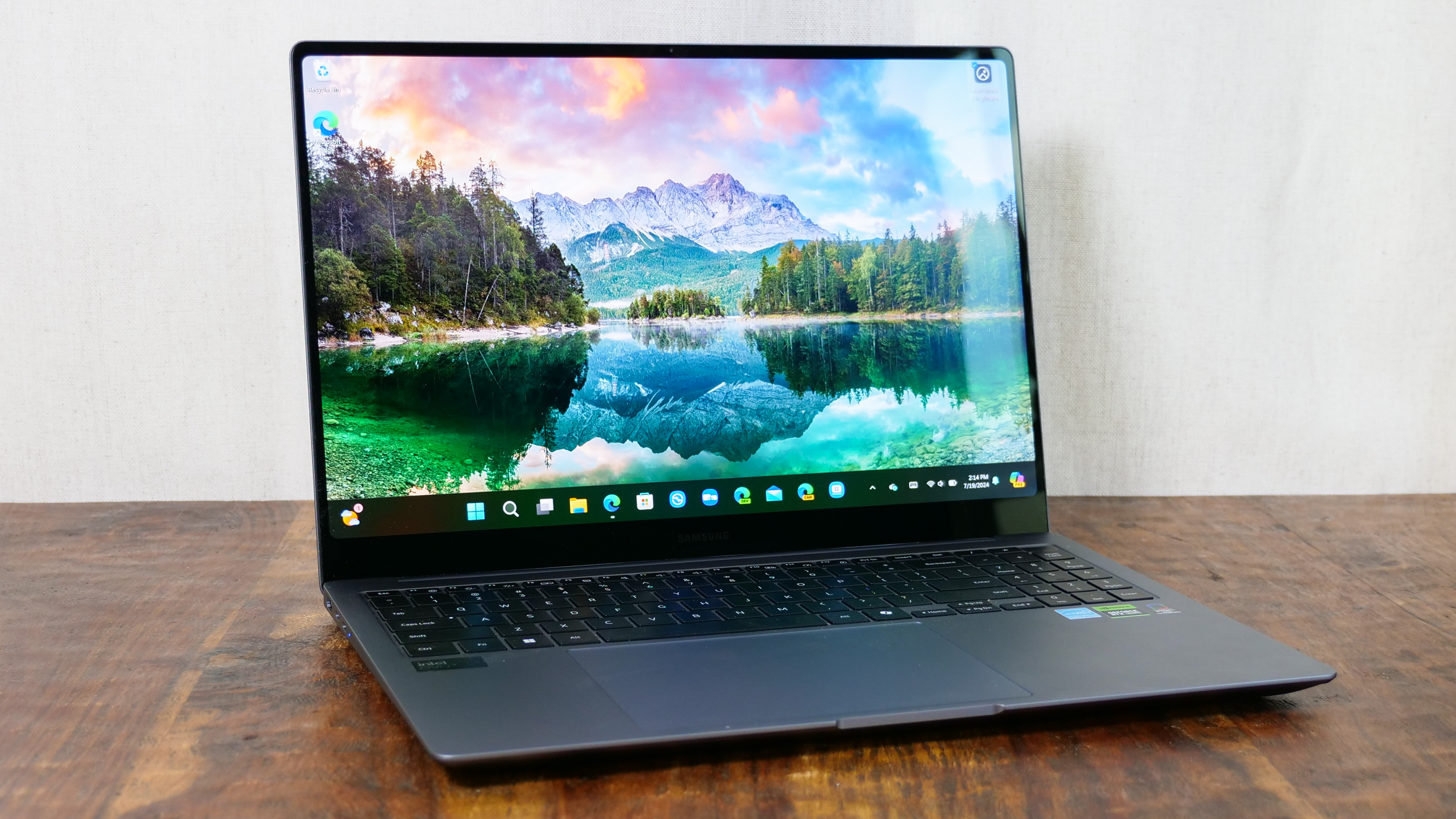
When you develop an “Ultra” product, you set lofty expectations for the device you need to deliver. Samsung is no stranger to this strategy; the company throws everything but the kitchen sink into its Galaxy S Ultra phones, and the Galaxy Book 4 Ultra takes those same lessons into the laptop realm.
The Book 4 Ultra packs the highest-end Intel Core Ultra 9 185H CPU and an Nvidia GeForce RTX 4070 GPU into a relatively thin and light chassis to push pixels around at 120Hz on one of Samsung’s typically mesmerizing AMOLED panels. Samsung is clearly targeting the ever-popular content creator market with this laptop, but its combination of features lends it to programming, casual gamers, students, or even business users.
So, what’s the catch? Those premium features are reflected in the price, starting at $2,399 and topping out at $2,999 for my review configuration. However, I do have some good news on that front in our price and configurations section below, so don’t dismiss it just yet because of the cost.
The Galaxy Book 4 Ultra delivers an excellent overall experience. The ever-improving Samsung ecosystem makes a compelling case for the Galaxy Book over some of our other favorite premium laptops, particularly for users with a Samsung phone or tablet.
Samsung Galaxy Book 4 Ultra: Specs
Samsung Galaxy Book 4 Ultra: Price and configurations
I reviewed the top configuration of the Samsung Galaxy Book 4 Ultra, which has an Intel Core Ultra 9 185H processor, an Nvidia GeForce RTX 4070 8GB GPU, 32GB of RAM, a 1TB SSD, and a 16-inch AMOLED, 2,880 x 1,800, 120Hz touch display. This configuration costs $2,999, which is sure to cause sticker shock for some, but outside of a workstation or high-end gaming laptop, these are top-tier specs, so the price comes with the territory.
There’s only one other model available, which, for $2,399, includes an Intel Core Ultra 7 155H, an Nvidia GeForce RTX 4050 6GB GPU, and 16GB of RAM. The 1TB of storage and 16-inch AMOLED display remain the same.
"Samsung is clearly targeting the ever-popular content creator market with this laptop, but its combination of features lends it to programming, casual gamers, students, or even business users."
If this sounds too expensive, the good news is that deep discounts abound for this laptop. At the time of this review’s publication, you can get the high-end model for $2,349 or the base model for $1,899 directly from Samsung, which makes a world of difference.
If you want this level of performance for less, consider our best gaming laptops under $1,500, but be prepared to make some tradeoffs, particularly on the display and overall build quality.
Samsung Galaxy Book 4 Ultra: Design
The Galaxy Book 4 Ultra is a study in minimalism, with the glinting prismatic Samsung logo on the lid as the only attention-grabbing element on display. The “Moonstone Gray,” as Samsung calls this color, looks like the dark gray that’s dominated many cars and laptops for the last decade, crowd-pleasingly inoffensive.
While it’s thin for a 16-inch laptop, Samsung uses visual trickery to make the Galaxy Book 4 Ultra appear even thinner. Viewed directly from the side, you see that it has a relatively uniform thickness from front to back, but Samsung tapers the edge of the laptop, giving it a wedge appearance from a slightly higher angle. This also keeps the vents on the side out of sight, so you get the improved thermal performance without a gaming laptop or workstation look.
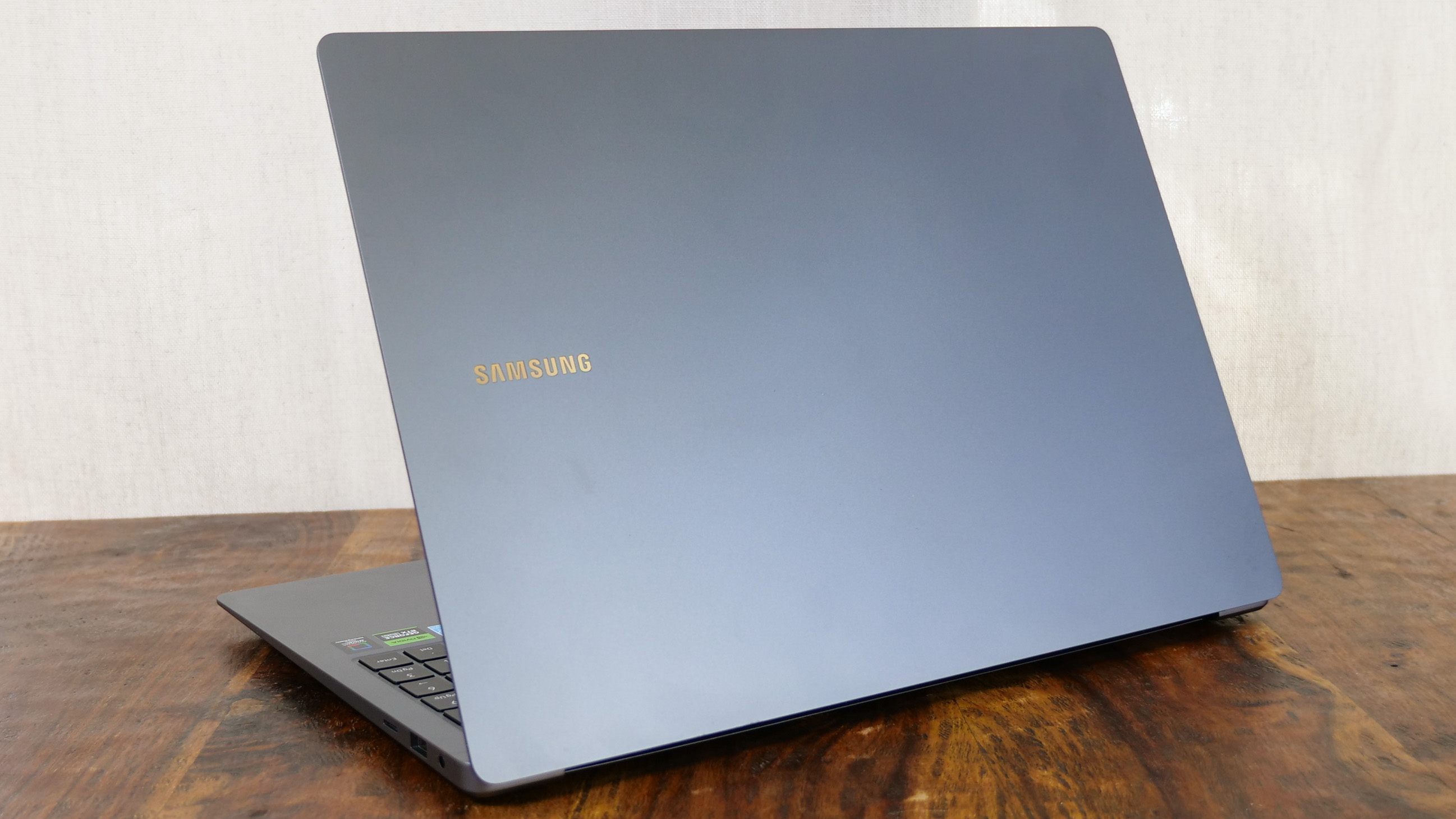
Opening the lid, you are greeted by the same grey on the deck, broken up by the black chiclet-style full keyboard. The touchpad is massive, taking up roughly 40% of the bottom of the laptop, and it’s slightly left of center to align properly below the spacebar.
At 4.1 pounds and 14 x 9.86 x 0.65 inches, the Samsung Galaxy Book 4 Ultra is thinner and lighter than most of its 16-inch competition. The HP Spectre x360 16 (2024) (4.3 pounds, 14.1 x 9.7 x 0.8 inches) comes the closest, but the Lenovo Yoga Pro 9i (4.7 pounds, 14.3 x 10 x 0.7 inches) and the MacBook Pro 16-inch (4.8 pounds, 14 x 9.7 x 0.65 inches) are both over half a pound heavier than the Galaxy Book.
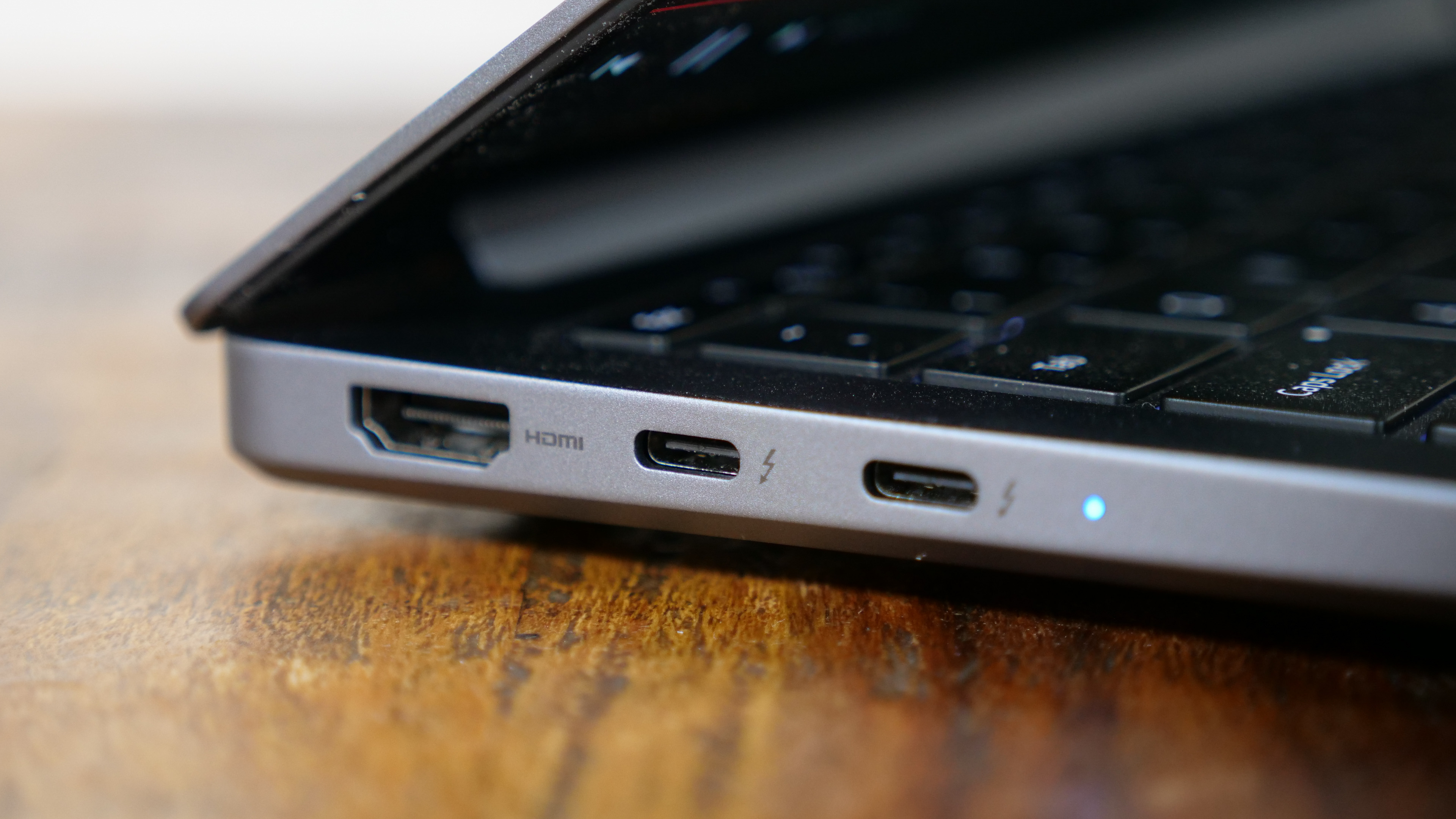
Samsung Galaxy Book 4 Ultra: Ports
The Galaxy Book 4 Ultra nearly covers all the bases with its collection of ports.
On the left, there’s an HDMI 2.1 port and two Thunderbolt 4 ports. On the right side are the combo headphone and mic jack, a USB 3.2 Type-A port, and a microSD card slot.
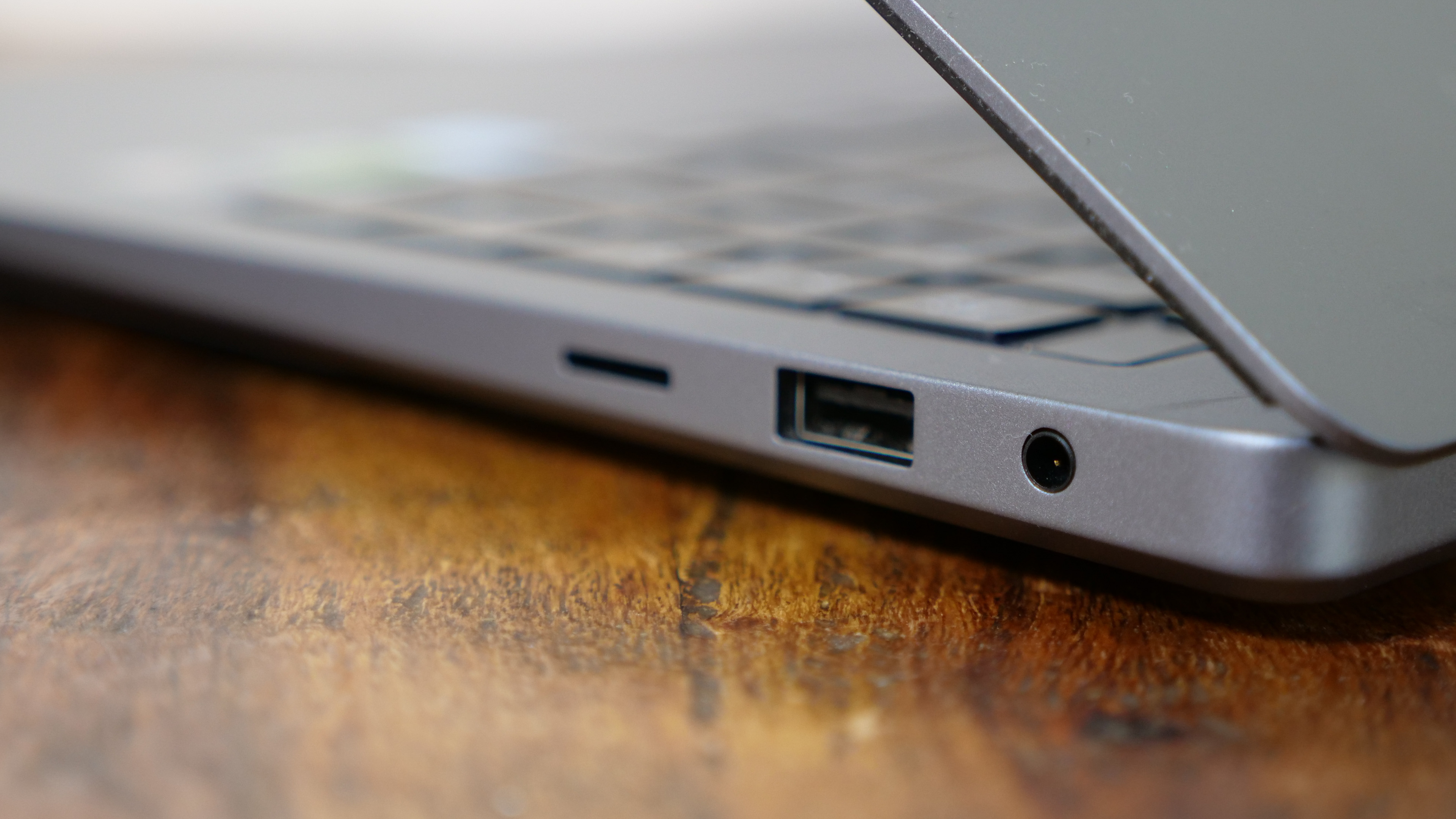
My only complaint is the microSD card reader. A full-size SD card reader is far more useful to this laptop's target audience, and there’s certainly room in the chassis, but it’s not a deal-breaker.
If you need a full-size SD card reader or any other port not offered by the Galaxy Book 4 Ultra, see our best USB Type-C hubs or best laptop docking stations.
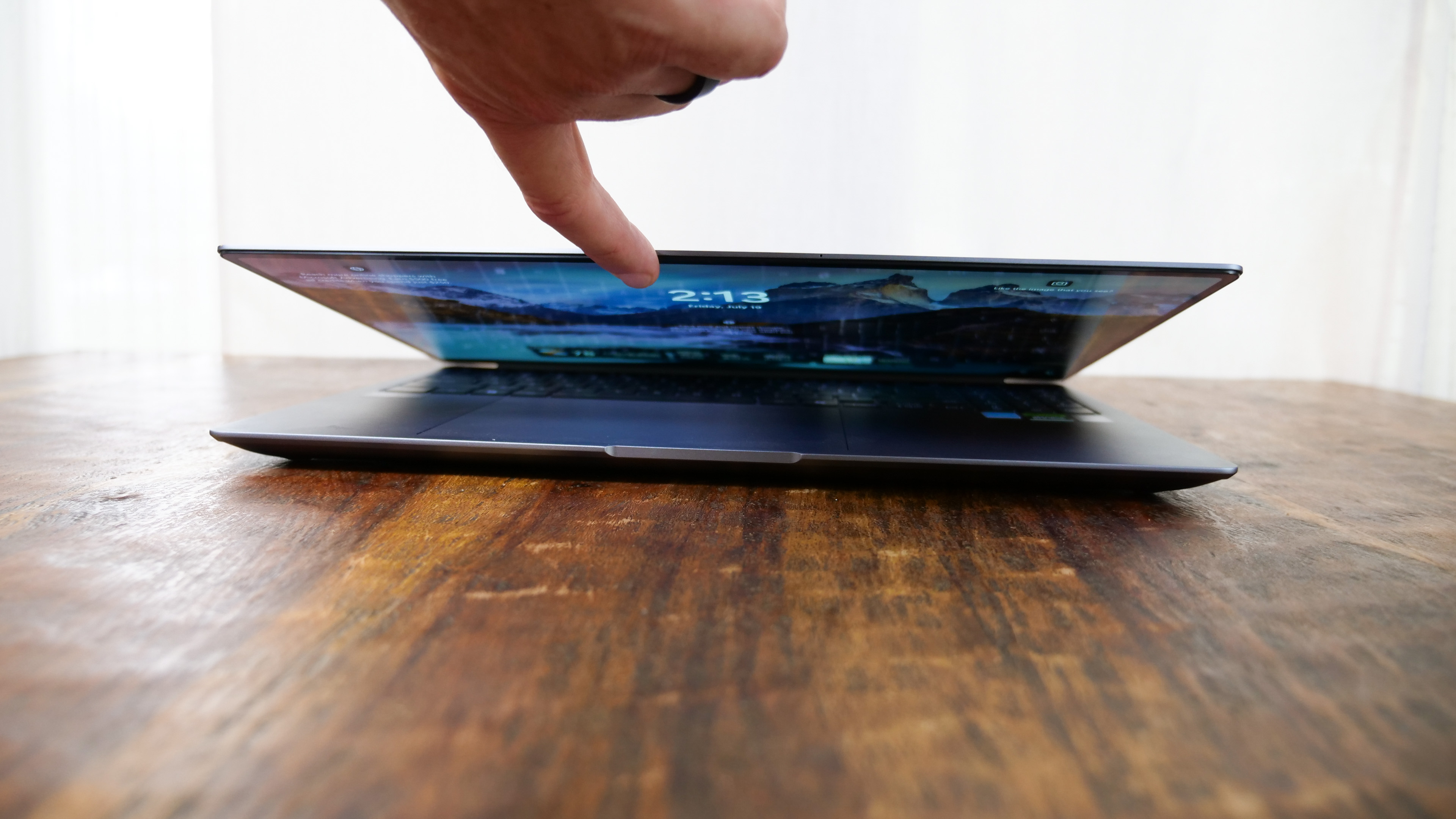
Samsung Galaxy Book 4 Ultra: Display
Opening the lid, you are greeted by the Samsung Galaxy Book 4 Ultra’s 120Hz 3K (2,880 x 1,800) AMOLED touchscreen. It’s a mouthful to say, but the panel produces an eyeful of gorgeously sharp and vibrant imagery.
While the laptop is suitable for a variety of users, content creators are high on Samsung's priority list, and it’s an outstanding display for that purpose. It delivers vibrant colors without trending into oversaturation and gives you a bright enough image for most environments.
I watched the latest trailer for Deadpool & Wolverine, and the AMOLED panel put on a real show. This display's deep blacks and contrast-heavy HDR capabilities were tailor-made for the heavily stylized look of this movie. The two titular characters striding across a street in their signature red and yellow pop off the display. This doesn’t necessarily show up in the lab tests, but for a cinematic experience on a laptop, the Galaxy Book 4 Ultra stacks up well against anything else on the market.
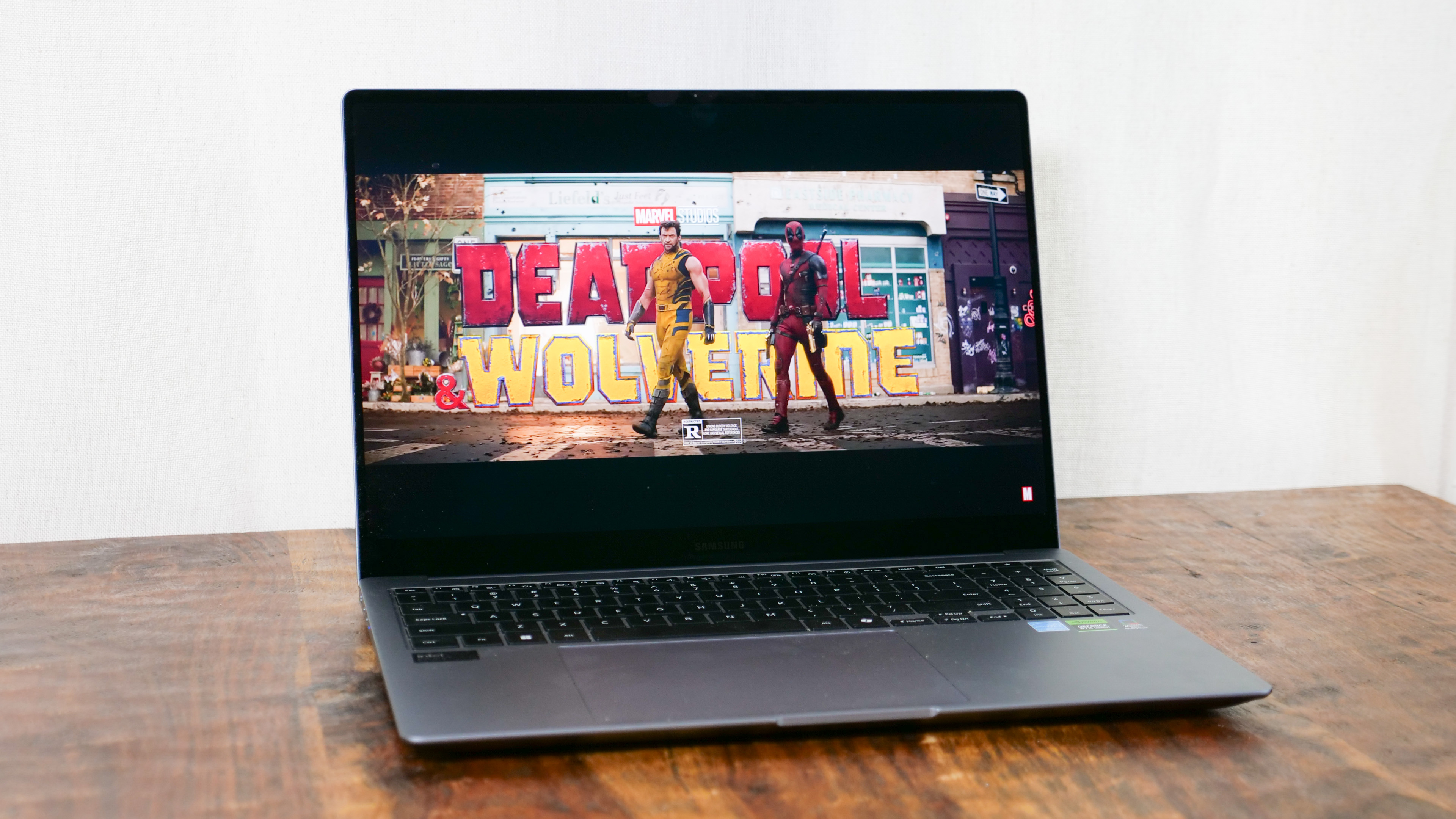
This carries through to gaming; I spent some time playing Hades, and the vivid colors and sharp lines of the animated 3D chaos looked gorgeous, while the 120Hz panel kept the action smooth. It motivated me to dip into more favorites from my Steam library to give them a second life on a far superior display to the old monitor I was playing on a few years ago.
Turning to our lab testing, our colorimeter measured the Book 4 Ultra at 81.8% of the DCI-P3 color gamut, which precisely matches the MacBook Pro 16. The Lenovo Yoga Pro 9i tops them both by covering 105.7%. The premium laptop average currently sits at 87.5%.
At 384 nits of brightness, the Galaxy Book 4 Ultra is good enough for anything but direct sunlight, though it falls below the current premium laptop average of 467 nits. This is the price you pay for the deep HDR capabilities of an AMOLED, which suppresses the high-end brightness. By comparison, the mini-LED display in the MacBook Pro 16 at 560 nits is one of the brightest we’ve tested, while the Lenovo Yoga Pro 9i comes in just behind the Book 4 Ultra at 373 nits.
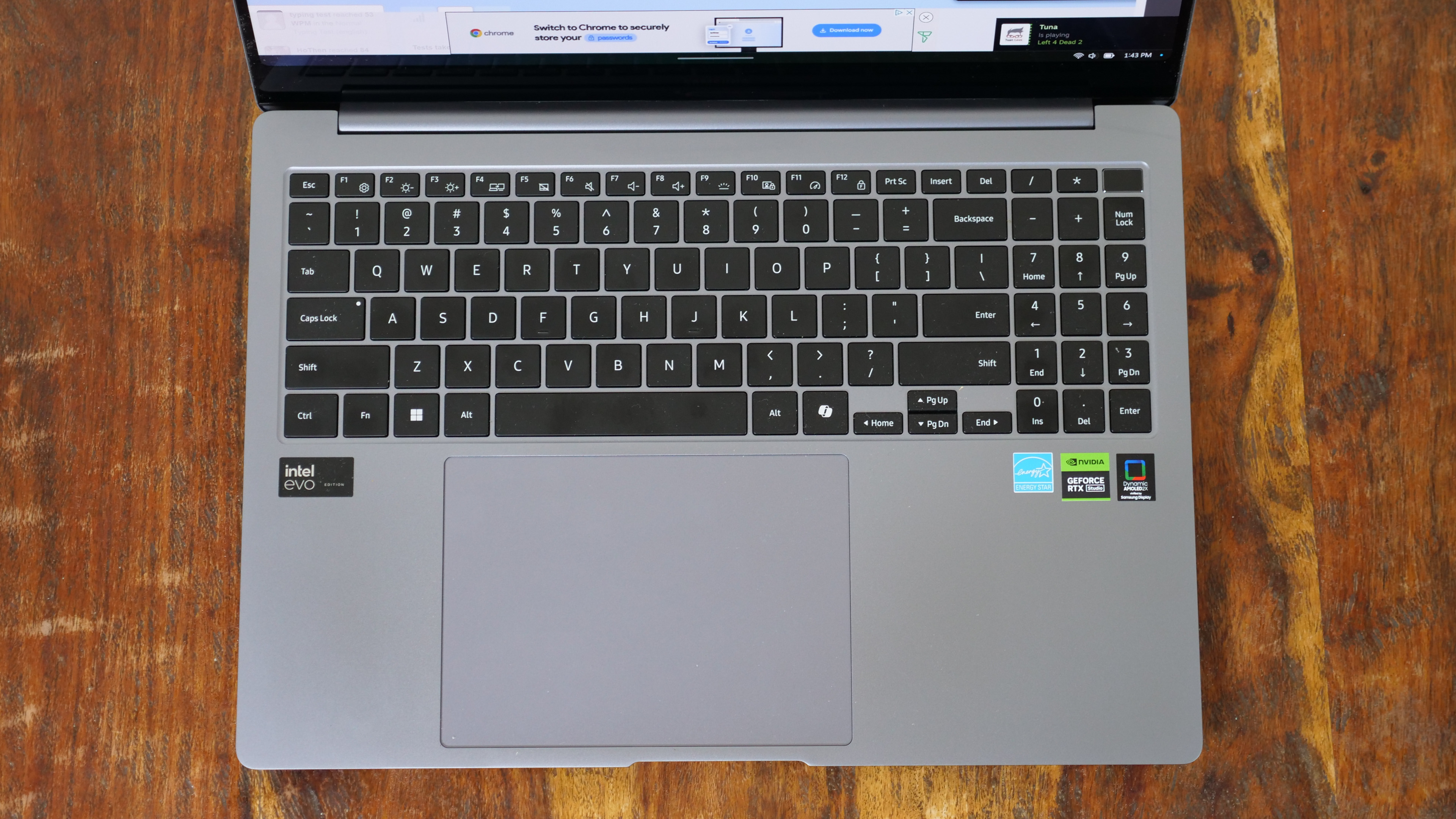
Samsung Galaxy Book 4 Ultra: Keyboard, touchpad, and touchscreen
When I first typed on the Samsung Galaxy Book 4 Ultra keyboard, the resonant pounding of the keys startled me, but I quickly adjusted and found it extremely fast and comfortable.
The Galaxy Book 4 Ultra keyboard has minimal key travel at 1mm. Many prefer a 1.3mm to 1.5mm range for an easy and decisive keystroke. While I generally fall into that camp, this keyboard somehow manages to do more with less for me.
On the 10fastfingers.com typing test, I typed 91 words per minute with 99% accuracy, which beats my average of 86 words per minute. Accuracy is often one of the concerns with a shallower keyboard; I just didn’t experience that with the Galaxy Book 4 Ultra. Samsung did an excellent job with key spacing, and the keyboard's clickiness could also play a role, providing audible feedback so you don’t question whether it registered.
I owned handheld PCs that were smaller than the touchpad on the Galaxy Book 4 Ultra. At 4.4 x 6.1 inches, you have all the real estate you could want below the keyboard to navigate and gesture around Windows 11. Taps and swipes registered immediately, and its smooth surface didn’t ever catch my finger. When typing, my hands fit conveniently on either side of the touchpad, and palm rejection successfully prevented any random touches from registering while typing.
The Galaxy Book 4 Ultra's multi-touch touchscreen also performed well, quickly registering taps and swipes. I did not regularly use this feature, as I prefer to use the touchpad or a mouse to navigate a traditional clamshell laptop, but for those who like having the option, the touchscreen won’t fail you.
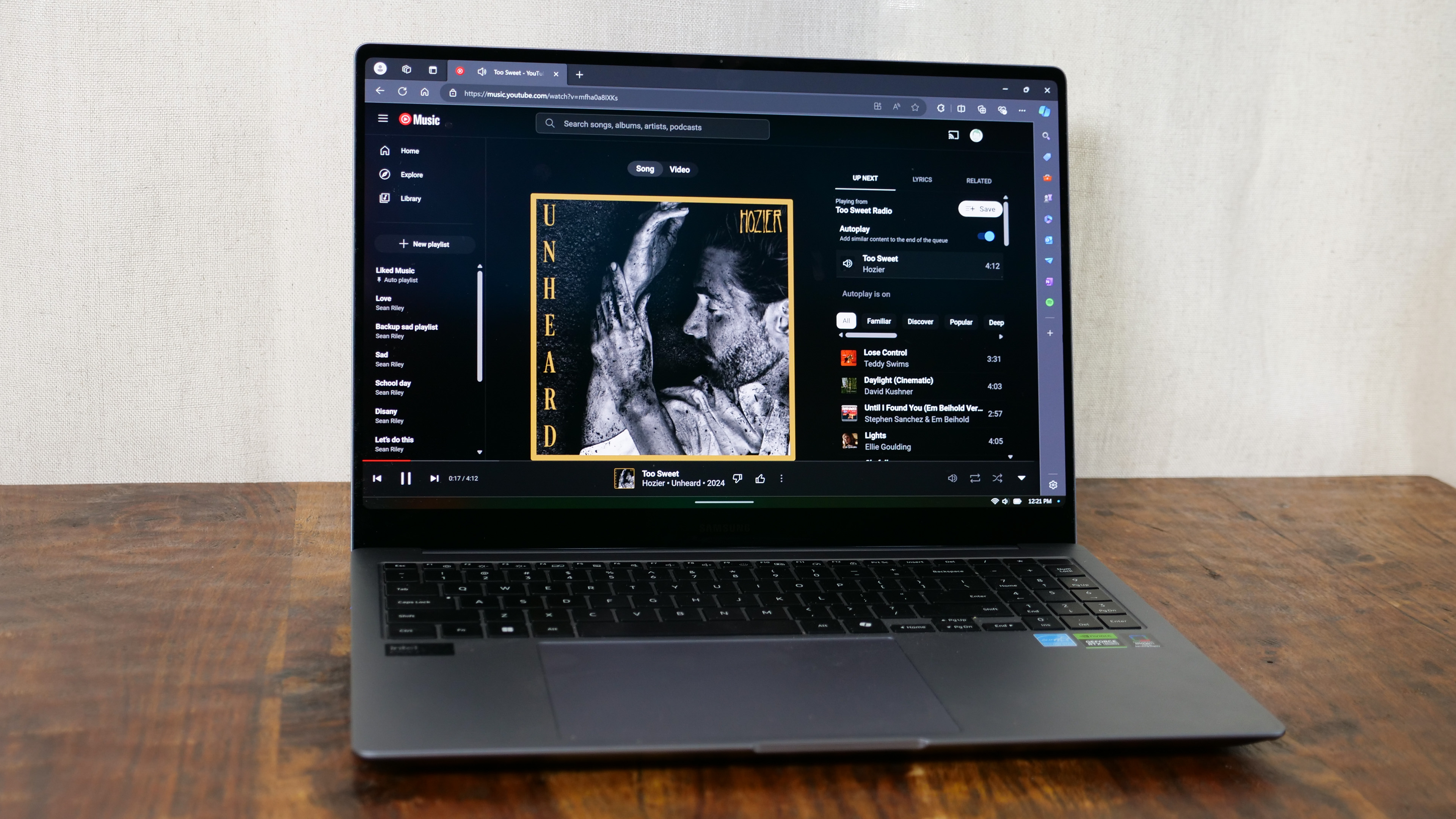
Samsung Galaxy Book 4 Ultra: Audio
The Galaxy Book 4 Ultra boasts a quad-speaker system, which sounds better on paper than in person. The speakers are bottom-firing, or if you are being charitable, side-firing, located below the deck but not literally on the portion of the laptop that would rest on your desk or lap.
Volume isn’t the issue; I could turn it up loud enough to fill my roughly 16’ x 22’ living room, but there’s no depth or bass.
I listened to “Too Sweet” by Hozier for an audio test. The opening bass line and vocals sounded crisp and clear, but it all fell apart as additional instrumentation and backup vocals came in. There’s no soundstage, so everything collapses in a muddled mess.
You'll be fine with the built-in speakers for gaming or watching videos. For anything more sonically complicated, invest in a pair of wireless headphones.
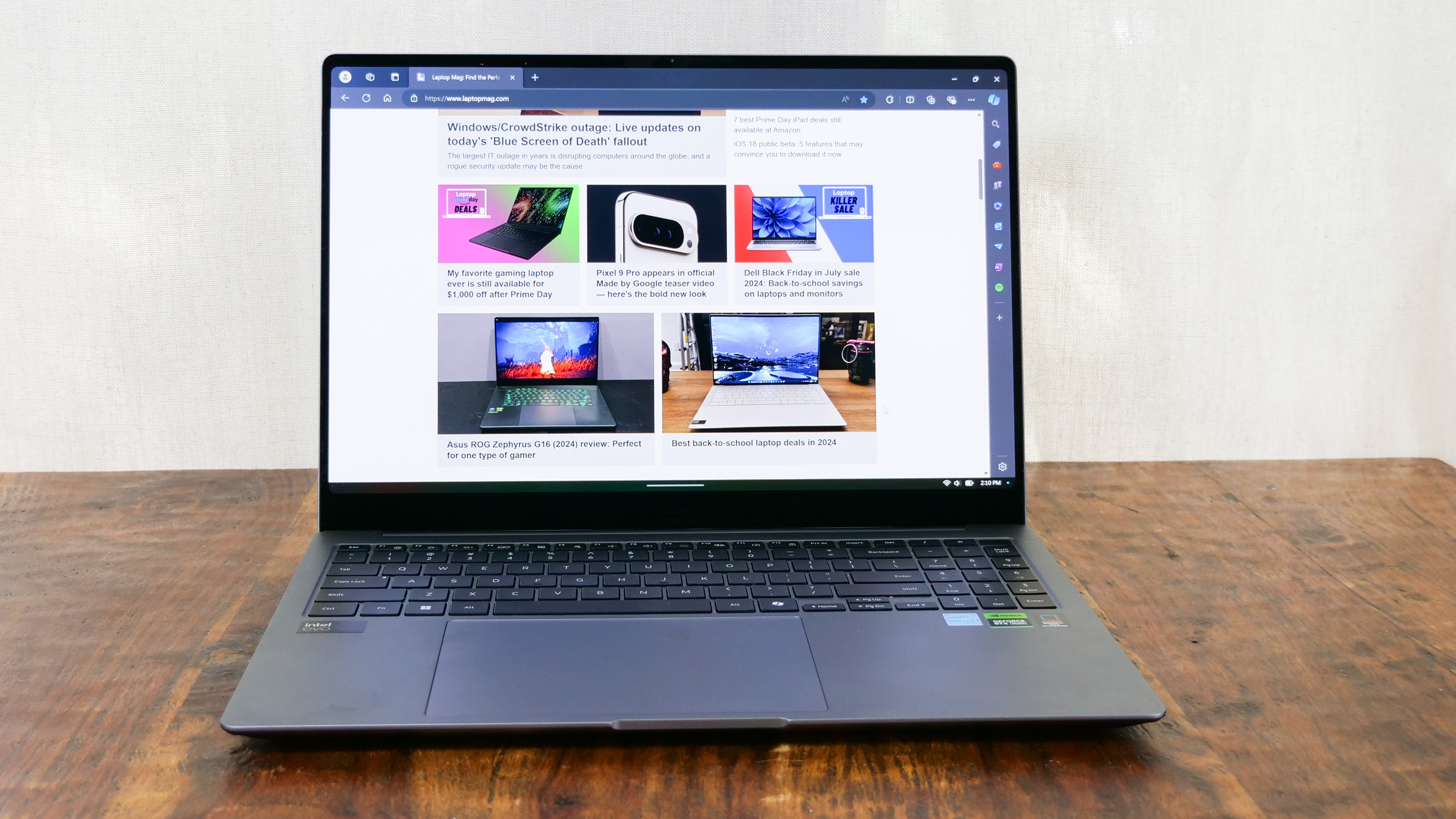
Samsung Galaxy Book 4 Ultra: Performance
The Galaxy Book 4 Ultra's Intel Core Ultra 9 185H processor impressed me with solid productivity and overall performance. I ran the laptop through a typical array of daily tasks, including running a dozen Google Chrome tabs in three separate windows. Five tabs ran YouTube videos at 1080p, and YouTube Music filled my office with my favorite soundtracks in another tab. The other tabs were a mix of Google Docs, Google Sheets, research for this review, and various rabbit holes I plunged down over the day. It glided through every task with ease.
On the Geekbench 6 overall performance test, the Galaxy Book 4 Ultra scored 13,061 in multi-core, easily defeating the premium laptop average of 8,763. It also outpaced its Windows rival, the Lenovo Yoga Pro 9i (12,141, Intel Core Ultra 9 185H). That unstoppable juggernaut, the MacBook Pro 16 (21,182, M3 Max), kept the Book 4 Ultra from a clean sweep. If you want raw CPU performance, there’s nothing to defeat the MacBook Pro M3 Max, but that configuration rings up for $3,999 and is rarely discounted by more than $200-$300, so you are paying a premium for it.
Our Handbrake test offers a more real-world look at performance, converting a 4k video to 1080p. The Galaxy Book 4 Ultra finished in 4 minutes and 52 seconds. That’s considerably faster than the premium laptop average (7:21). Still, it is up against stiff competition in the Lenovo Yoga Pro 9i (3:53) and the MacBook Pro 16 M3 Max (2:36). It’s a strong result for the Galaxy Book, which will handle video editing tasks well, but if you’re a professional editor and seconds count, it falls below the top options.
Samsung’s 1TB SSD similarly performed well, transferring a 25GB file at a rate of 1,883.6 MBps, easily outpacing the premium laptop average (1,416.5 MBps). However, the Yoga Pro 9i (2,100 MBps) once again proved too much for it. Unfortunately, we can’t compare the MacBook Pro 16 M3 Max, as macOS doesn’t support our drive speed test.
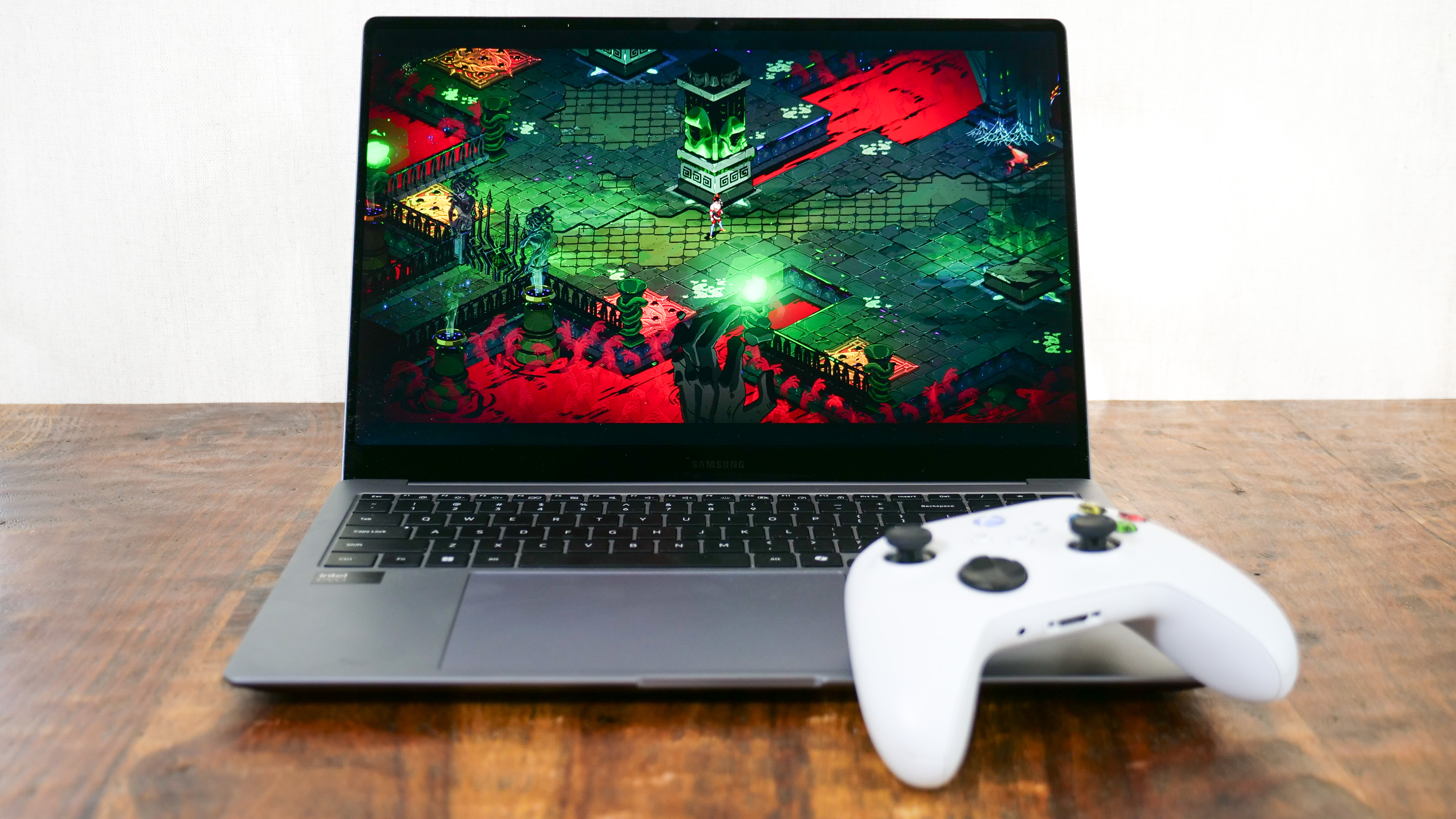
Samsung Galaxy Book 4 Ultra: Graphics
The Galaxy Book 4 Ultra isn’t a gaming laptop, but it can do a reasonable impression of one. Its RTX 4070 GPU with 8GB GDDR6 VRAM allows it to play most AAA titles; just don’t plan on maxing out the settings. You’ll also appreciate that RTX 4070 when it comes to video editing and other GPU-intensive tasks, which includes many AI apps, so it’s not wasted on you even if you aren’t a gamer or only occasionally dip a toe in the gaming world.
On the 3DMark FireStrike synthetic graphics benchmark, the Galaxy Book 4 Ultra scored 17,255, nearly doubling the average premium laptop (9,218), but the Yoga Pro 9i (19,016) once again came out on top. The 3DMark FireStrike benchmark isn’t available for the MacBook Pro 16.
Looking at actual gaming performance, the Galaxy Book 4 Ultra hit 79 frames per second (fps) on the Sid Meier’s Civilization VI: Gathering Storm benchmark (Medium, 1080p). That beat the premium laptop average (50 fps) and the MacBook Pro 16 (56 fps), but the Lenovo Yoga 9i Pro (128 fps) set a blistering pace that none of the others could match.
Samsung Galaxy Book 4 Ultra: Battery life
The Samsung Galaxy Book 4 Ultra doesn’t sound like it has the recipe for excellent battery life with a 3K display, a discrete GPU, a high-performance CPU, and a relatively thin and light design, but prepare to be amazed.
On the Laptop Mag battery test, the Galaxy Book 4 Ultra stayed powered up for 13 hours and 15 minutes. That easily beats the Lenovo Yoga Pro 9i (9:51) and the premium laptop average (11:13). Only the otherworldly Apple MacBook Pro 16 (18:05) defeats it.
Samsung Galaxy Book 4 Ultra: Webcam
The Galaxy Book 4 Ultra features a 1080p FHD webcam, and it’s…fine. Even in my office, where I can dial the lighting in pretty effectively, there’s a fair amount of grain in the image, and it’s just not sharp.
I will give Samsung credit for color accuracy. My green shirt and the orange side of my copy of The Complete Calvin and Hobbes were both spot on.
If you are doing a lot of virtual meetings or streaming, I’d still recommend checking out our best webcams, as the results will be much better. If you own a Samsung Galaxy phone, you can use the Camera Sharing function to use your phone as your webcam with your Galaxy Book 4 Ultra. You just navigate to Settings, then Connected devices, and finally, Camera Sharing to toggle the feature on.
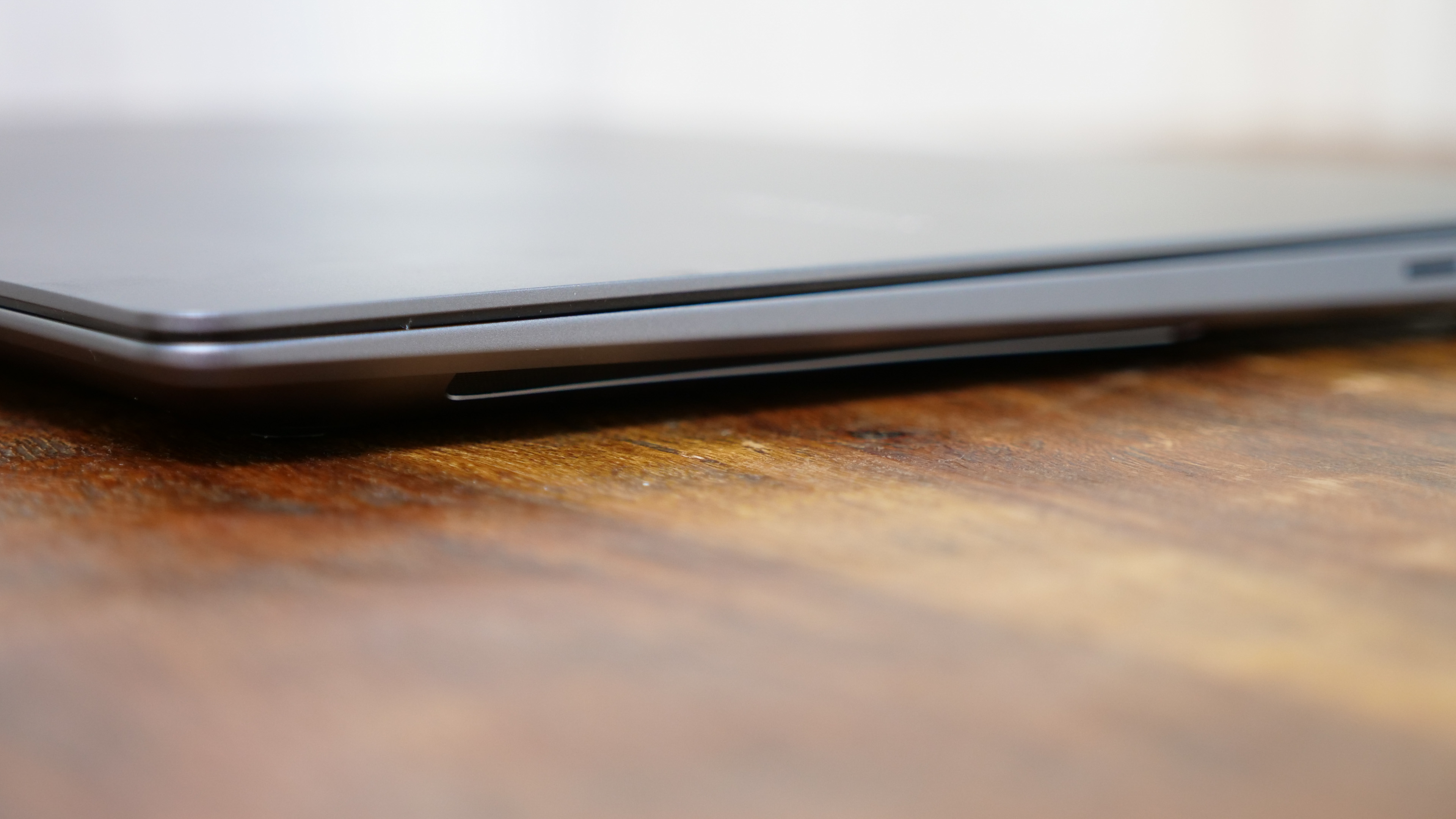
Samsung Galaxy Book 4 Ultra: Heat
It’s less of a shock after seeing its marathon battery life, but the Galaxy Book 4 Ultra keeps its cool despite its high-performance specs. The hottest temperature we recorded after 15 minutes of video playback was 92.3 degrees Fahrenheit on the bottom of the laptop, below our 95-degree threshold for comfort. The keyboard was a comfortable 88.3 degrees, while the touchpad was an almost cool 77.2 degrees.
Samsung Galaxy Book 4 Ultra: Software and warranty
The Galaxy Book 4 Ultra comes with Windows 11 Home and an abundance of Samsung apps. While some will undoubtedly categorize those apps as bloatware, Samsung does helpfully group them under the Galaxy Book Experience so you can peruse the full list and determine what you’ll use.
It includes 16 apps, some of which are very basic, like the Samsung Account app or Live Wallpaper. Others depend on your being in the Samsung ecosystem with a Samsung smartphone or tablet, like Second Screen, Phone Link, or Samsung Flow. I’d encourage you to at least try the apps before deleting them, particularly if you have any other Samsung devices.
The Galaxy Book 4 Ultra has a one-year limited warranty. See how Samsung performed in our annual Tech Support Showdown ranking.
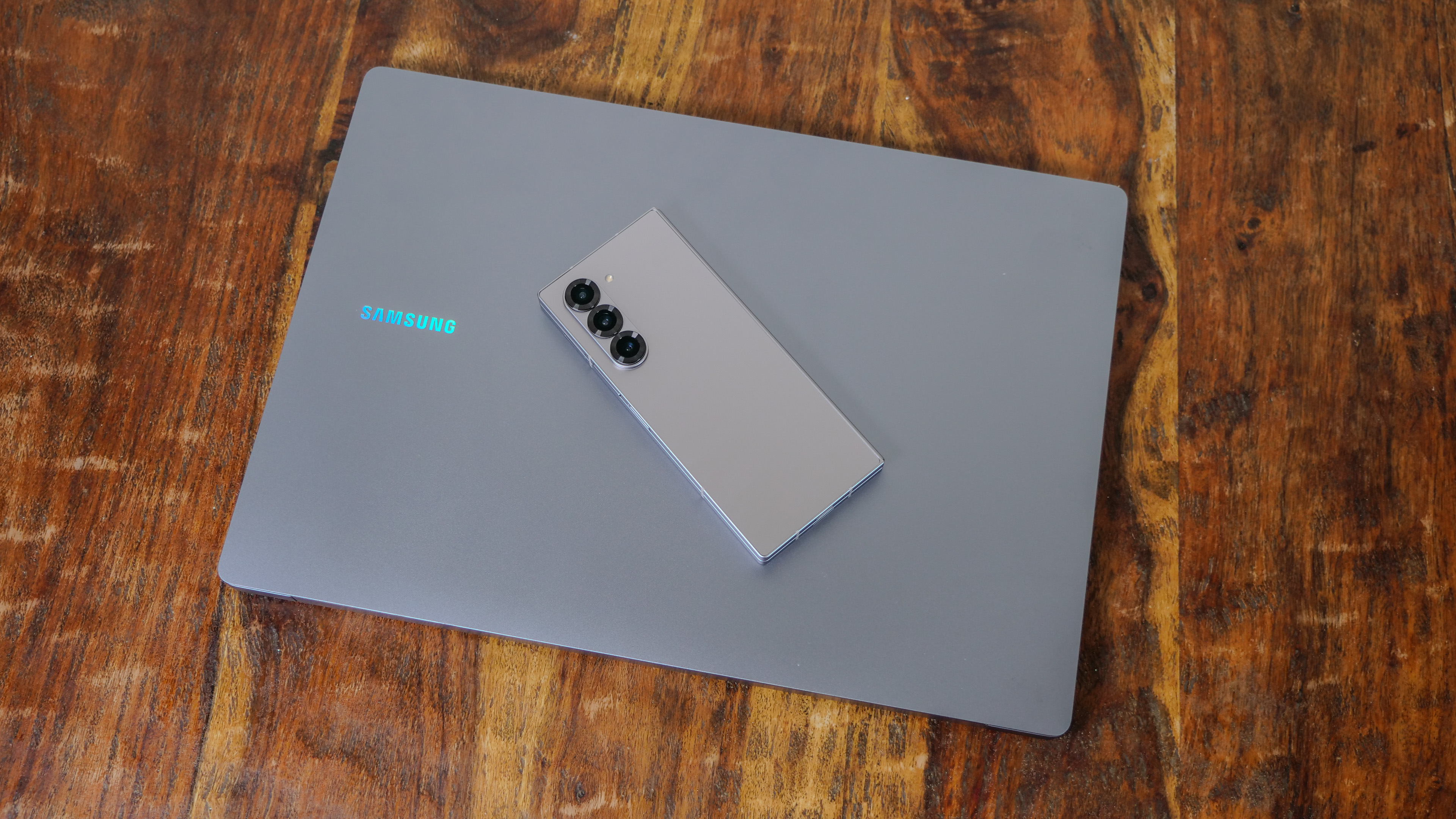
Bottom line
The Samsung Galaxy Book 4 Ultra is in a challenging market segment but rises to that challenge. It offers an impressive balance of performance and efficiency in a relatively light chassis with a gorgeous 16-inch 120Hz OLED display. This compelling combination makes it a strong contender for a wide variety of use cases, as long as the price isn’t a showstopper.
"The Samsung Galaxy Book 4 Ultra is in a challenging market segment but rises to that challenge."
The biggest challenger on the Windows side is the Lenovo Yoga Pro 9i, which is the stronger option if you are a content creator. The battery life is the most significant tradeoff there at nearly three and a half hours less. Overall, it offers superior performance in the areas that count for video editing and photo editing. However, for programmers and more general users like students or business users, that extra battery life will likely swing you back in favor of the Galaxy Book 4 Ultra.
The MacBook Pro 16, either M3 Pro or M3 Max, wins in most categories against the Galaxy Book 4 Ultra. When making this decision, consider whether you prefer Windows or macOS and whether you are in the Samsung or Apple ecosystem with your other devices. Budget will also be a factor; the MacBook Pro 16 is more expensive and rarely discounted by more than $200.
If you choose the Samsung Galaxy Book 4 Ultra, just make sure you aren’t paying full price. Great deals are always available, and at those discounted prices, the laptop becomes a solid value.







